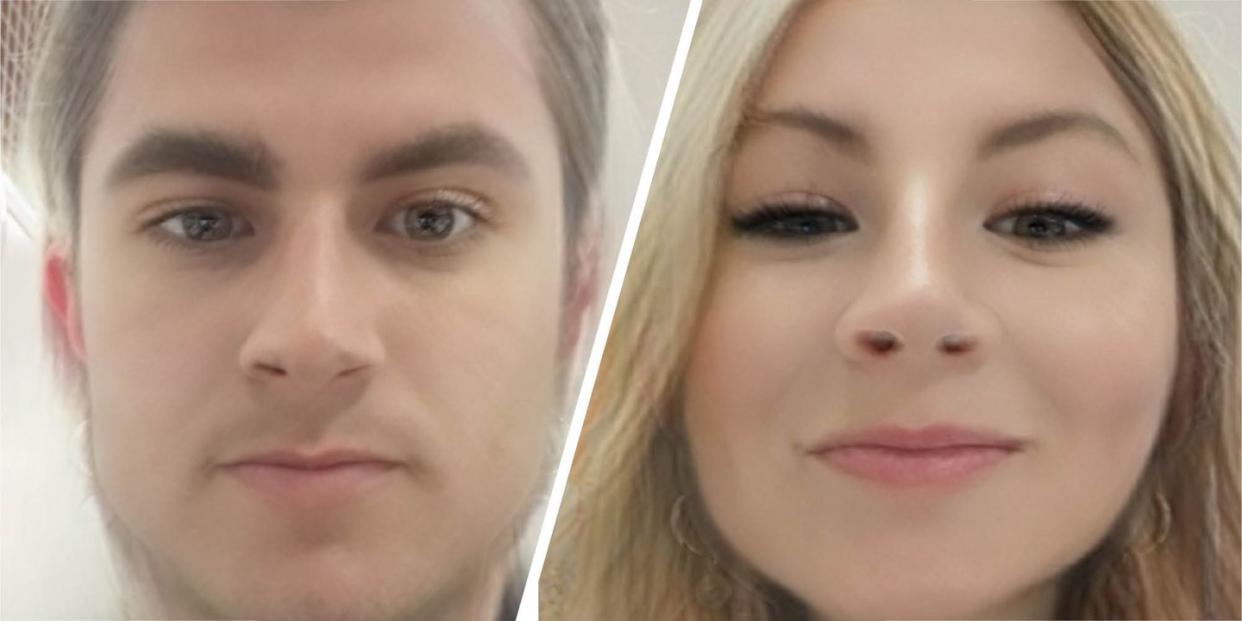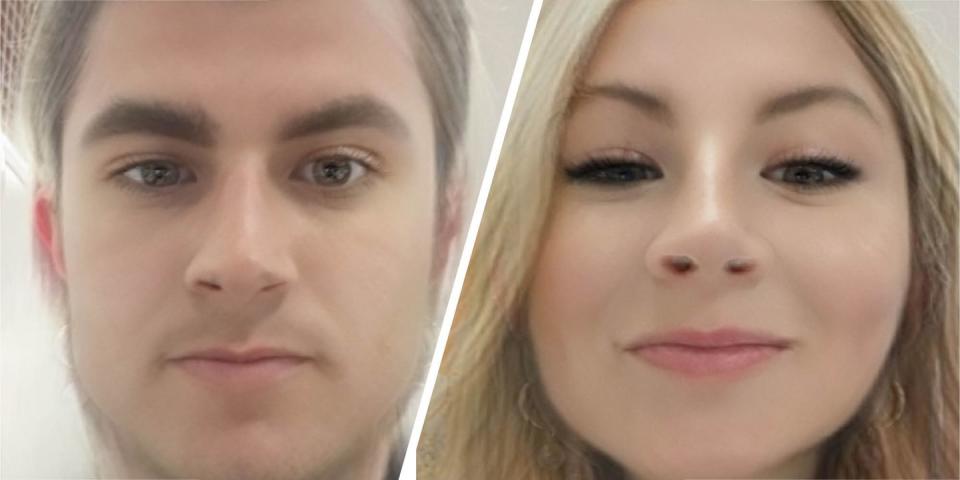The damaging impact of Snapchat’s gender swap’s filter you might not even realise

ICYMI: over the past few weeks, people the world over have been sharing images of themselves online using a new "gender swap" Snapchat filter. It allows users to morph themselves into a "woman" with a high-femme look, or a "man" which is hyper-masculine and basically just you with a beard and a wider jaw.
Now not to be that party pooper, but this filter isn't just harmless fun. It also gives us an insight into how trans and gender non-conforming people are seen by and treated in society.
As someone who identifies as non-binary and expresses their gender in many ways, seeing these people having fun with the filters, and having a giggle has been reasonably harmless. The accuracies of the filter when it comes to facial recognition is impressive, and seeing people get their life and flick that fake wig has been iconic. However, nuance and context is incredibly important when filters like this go viral.

I was assigned male at birth, and now present in a "feminine" way outside of the gender binary. That's why, as fun as it is, it’s also hard for me to see cis [non-transgender] people using the filter and immediately finding it hilarious to see themselves in makeup and with a digital wig. It's as if people like me who are gender non-conforming are only something to be consumed and laughed at, rather than actually listened to. Not to mention, according to the filter, what makes a person "masculine" or "feminine" is based on outdated gender stereotypes.
And to add even more necessary contect, there’s a long history of people "gender swapping" in films and TV for comedic effect - from Mrs. Browns Boy's to Little Britain and Mrs. Doubtfire.
I was pleased to see that this reaction wasn’t just a case of me being "a snowflake", as many trans and gender non-conforming people started to post about their concerns, namely how harmful this can be.
A post shared by JAMIE WINDUST (@leopardprintelephant) on May 9, 2019 at 1:17pm PDT
"I’m a non-binary person who was steered clear of Snapchat and I’m glad of it," says Morgan, who's non-binary. "The 'gender swap' filter would make me unbearably dysphoric. The idea that masculinity equals a stronger jaw and a beard is so limiting, and would absolutely make me feel inadequately masculine on more dysphoric days."
Sure, most people are using the filter for fun. But some social spaces have become a breeding ground for others who are using the filter to publicly mock the trans and gender non-conforming community. "What isn’t fine (about the filter) is the amount of jokes that I’ve seen at the expense of trans people," Katy tells me. For example, ‘felt cute, might get a sex change later,’ or, ‘I now identify as x/y/z/attack helicopter’ in order to mock those who come out [as trans or non-binary]."
It's also deeply problematic that people are sharing their "gender swap" pics to discuss how sexually attractive they now are. "Society holds trans and gender non-conforming people at two black or white views regarding sexuality. They’re either viewed as ‘unfuckable’ or ‘fetishised and fuckable’, which is a grim notion in itself," Katy adds.
Everyone using the new gender bending Snapchat filter or whatever: lol what a fun novelty
Me, a trans: pic.twitter.com/FKfgS7AmsY- Robyn MJ McConnell 🏳️🌈 (@CubixFails) May 11, 2019
The psychological impact sharing your "gender swap" pics can have
Dr Meg-John Barker, author of ‘Life isn’t Binary’ and therapist, explains the viral use of this filter can have some really damaging effects on trans and gender non-conforming folk. “Probably the biggest problem is that people sharing their 'gender swapped' pics tend to present them as funny. This links in to the long history of trans people being seen as objects of ridicule, and the idea that anybody expressing a different gender to the one they were assigned at birth is something to laugh about. Think about all the movies where gender swapping is the focus of the comedy. Mainstream media is gradually moving away from these kinds of transphobic representations so it's a shame to see them cropping up on social media again now”.
Barker also talks about how for those who are already questioning their gender identity, the filter can be unsettling. “For those who have gender dysphoria (serious discomfort around their gender), making changes is often a difficult and painful process so it's hard to see sudden transformation pics. Also, the idealised forms of masculinity and femininity in the pics support the common idea that there are certain kinds of masculine and feminine appearances that everyone should be aspiring to.
A post shared by JAMIE WINDUST (@leopardprintelephant) on May 4, 2019 at 12:42pm PDT
"That's a bad message for everyone - cisgender and trans - as very few people can conform to ideals of physical attractiveness even for a short period in their lives. We should be celebrating the multiplicity of ways of being masculine, feminine, and all other kinds of gender expression: all of which can be equally beautiful if we can drop the limited oppressive cultural beauty standards”.
So although this filter may seem like harmless fun, it’s vital for us to analyse how and why we see such things as entertainment. If it’s entertaining at the expense of a marginalised group of people, it’s important we unpack that and use it as an opportunity to understand why it’s actually not OK.
Yes, it may seem like a bit of fun, but if we want to be truly social responsible online, we need to treat people of all genders with respect and empathy.
('You Might Also Like',)

